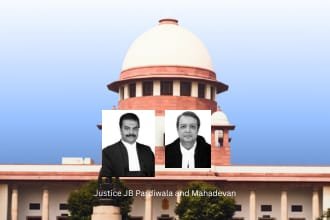The Bombay High Court on Thursday, August 21, 2025, made an unusual yet significant decision in an ongoing censorship dispute. The Court said it will personally watch the film Ajey: The Untold Story, which is based on the life of Uttar Pradesh Chief Minister Yogi Adityanath, before deciding on a plea challenging the Central Board of Film Certification’s (CBFC) refusal to certify the film.
The film, inspired by the popular book The Monk Who Became Chief Minister, is said to present the untold story of Yogi Adityanath’s political journey. However, the CBFC’s objection and eventual rejection of certification have sparked a legal battle that has now reached the Bombay High Court.
Background of the Dispute
The controversy began when Samrat Cinematics, the producers of Ajey, approached the CBFC seeking certification. The Examining Committee of the CBFC raised as many as 29 objections after screening the film. The objections were communicated to the filmmakers on August 11, 2025, with an expectation that they would respond or propose changes.
However, since the producers did not reply by August 12, the Revising Committee of CBFC took up the matter. The Revising Committee dropped eight of the earlier objections but ultimately refused certification on August 17.
On August 18, the producers approached the Bombay High Court and sought permission to amend their petition to challenge the Revising Committee’s rejection. The matter was listed for hearing on August 21 before a Division Bench comprising Justice Revati Mohite Dere and Justice Neela Gokhale.
Court’s Observation: Principles of Natural Justice
During the hearing, the Court took note of how the CBFC had handled the matter. Justice Revati Mohite Dere observed that the Board had failed to follow principles of natural justice in its approach. The Bench remarked:
“You should have done this in the beginning… When did you follow the principles of natural justice? This is an exercise you ought to have done for every film… You have failed to do it.”
This strong observation reflects the Court’s disapproval of the CBFC’s decision-making process and its inability to provide a fair opportunity to the filmmakers from the start.
The Key Legal Issue: Maintainability of the Plea
One of the preliminary issues before the Court was whether the amended petition is maintainable since the Cinematograph Act, 1952 provides an appeal mechanism.
Senior Advocate Abhay Khandeparkar, appearing for the CBFC, argued that the Board had followed due process and that the filmmakers had a statutory remedy to appeal under the Act.
However, Senior Advocate Ravi Kadam, representing the filmmakers, countered that the rejection not only violated fundamental rights of freedom of speech and expression under Article 19(1)(a) of the Constitution but also went beyond the CBFC’s jurisdiction. He highlighted that the CBFC had directed the producers to obtain a “No Objection Certificate” (NOC) from Yogi Adityanath himself, which he argued was entirely unlawful.
“They are not the guardians of a private person’s fundamental rights,” Kadam told the Court.
The Bench also acknowledged that while alternate remedies exist, the writ jurisdiction of the High Court cannot be completely ruled out.
The Court’s Unique Step: Watching the Film
In a rare move, the Bombay High Court directed the filmmakers to submit a copy of the movie, clearly marking the portions flagged by the CBFC. The Judges will themselves watch the film Ajey before passing any order.
A copy of the book The Monk Who Became Chief Minister—on which the film is based—has already been submitted to the Court.
By deciding to watch the film directly, the Bench aims to independently assess whether the CBFC’s objections are justified or whether the filmmakers’ freedom of artistic expression has been wrongly curtailed.
Larger Implications: Film Censorship and Free Speech
This case highlights a recurring tension between the CBFC and filmmakers in India. Over the years, several films dealing with political figures, religion, or social controversies have faced hurdles in certification. The demand for an NOC from a private individual, as alleged in this case, raises significant constitutional concerns.
If the Court finds that the CBFC acted beyond its jurisdiction, it may reaffirm that certification authorities cannot demand private approvals or impose restrictions that go beyond the scope of the Cinematograph Act.
The case also has wider implications for freedom of speech and expression in India. Courts have repeatedly held that artistic works, including films, enjoy constitutional protection unless they clearly fall within the reasonable restrictions provided under Article 19(2)—such as public order, decency, or security of the state.
What Happens Next?
The matter has been posted for further hearing on August 25, 2025. After watching the film, the Bench will decide whether the amended plea challenging the Revising Committee’s rejection order is maintainable and whether the CBFC exceeded its authority.
The outcome will determine not only the fate of Ajey: The Untold Story but also set a precedent for future cases involving political films and censorship disputes.
Key Legal Takeaways
- Natural Justice in Film Certification: The CBFC must provide fair opportunities for filmmakers to address objections rather than rushing to reject certification.
- Limits of CBFC’s Jurisdiction: The Board cannot compel filmmakers to obtain private NOCs from individuals depicted in films.
- Writ Jurisdiction of High Courts: Even when statutory remedies exist, High Courts can intervene under Article 226 to safeguard fundamental rights.
- Balancing Free Speech and Regulation: Courts continue to play a crucial role in ensuring that censorship does not curtail the freedom of expression beyond constitutional limits.
Conclusion
The Bombay High Court’s decision to personally watch Ajey: The Untold Story underscores the seriousness of the issue. At stake are not just the rights of one set of filmmakers, but the broader principle of free artistic expression in India.
As the legal battle unfolds, the verdict will be closely watched by filmmakers, political commentators, and constitutional experts. Whether the Court ultimately sides with the CBFC’s objections or upholds the filmmakers’ right to release the movie will shape the contours of film censorship jurisprudence in India.


